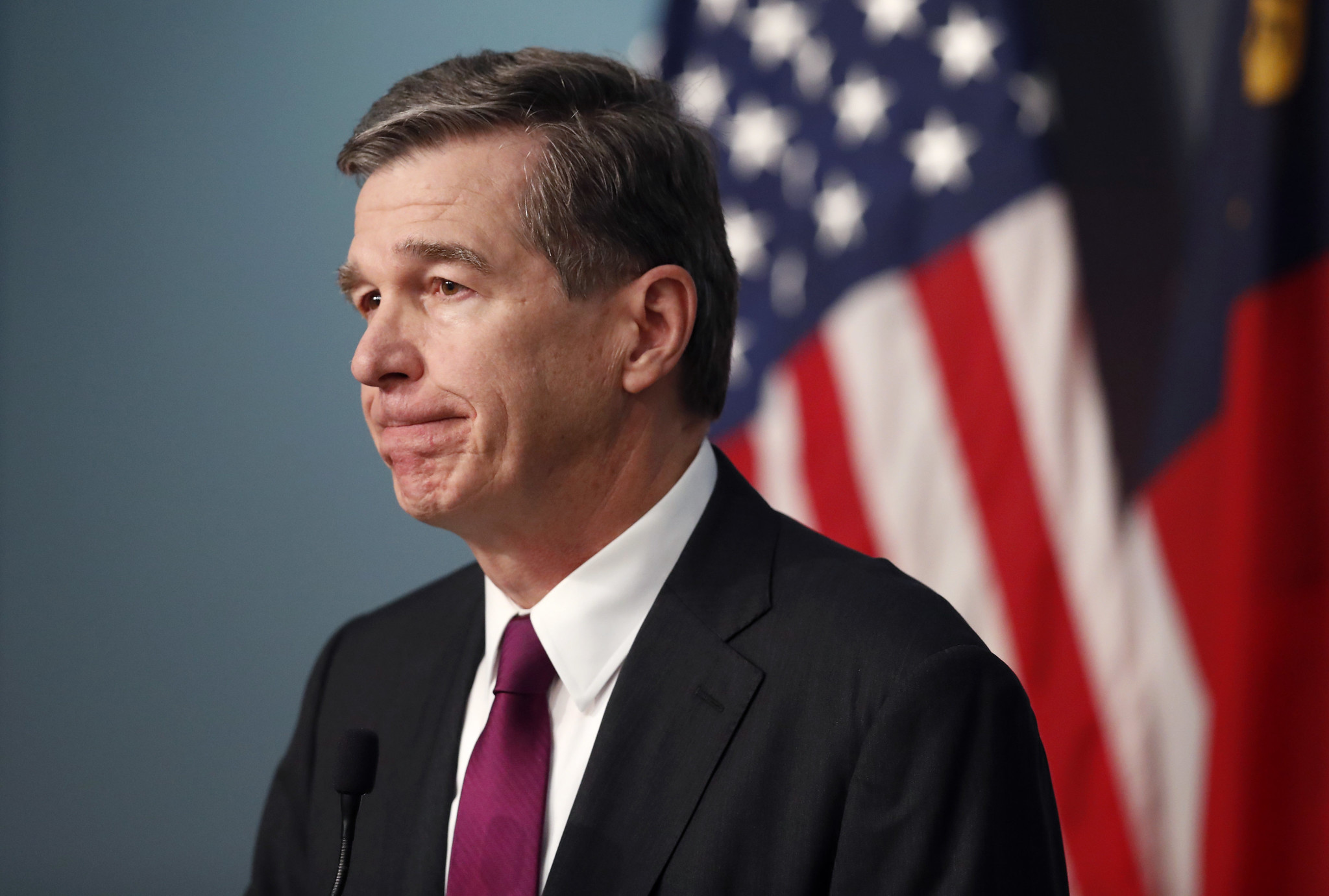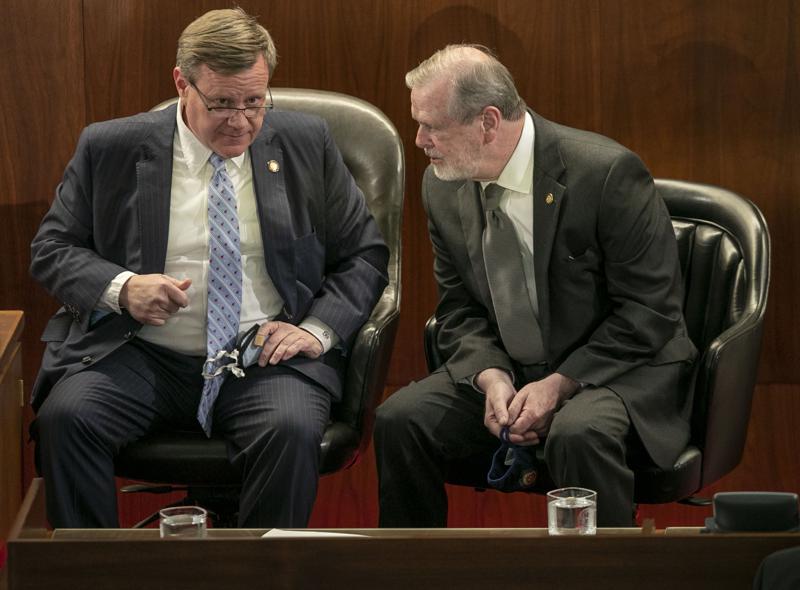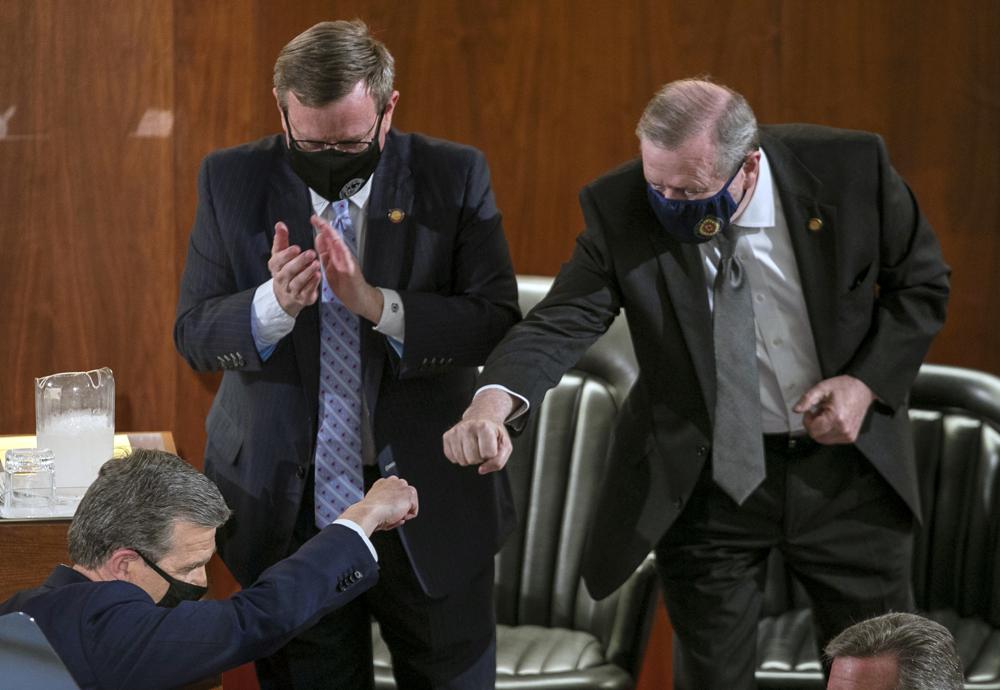Chances that a North Carolina budget standoff between Republican lawmakers and Democratic Gov. Roy Cooper will be resolved soon appear small enough that GOP legislators are looking to spend more funds to keep state government humming, then possibly go home.
Negotiations between Cooper and GOP lawmakers on a compromise have gone nowhere since June 28, when Cooper vetoed the two-year budget bill drawn up by Republicans.
Otherwise, Republicans also have tried without success to override Cooper’s veto, although the House — where several Democrats would have to join the GOP majority — hasn’t taken an actual override vote. Some of those Democrats, living in districts that would receive generous earmarks in the budget, have been the subject of intense lobbying by Republican leaders and Cooper.
Still, the focus of negotiations has been squarely on whether the state should expand Medicaid to hundreds of thousands more low-income adults, which Cooper and his allies want.
Senate leader Phil Berger of Rockingham County, a strong expansion opponent, said Tuesday that it’s clear Cooper won’t budge in negotiations on other matters unless there’s agreement that expansion will be approved. The sides also are far apart on tax cuts, public school construction, and teacher and state employee raises — items that Berger said are being delayed because of Cooper.
“The legislature passed a budget and the governor is blocking that budget or any budget based on our conversations over his Medicaid-or-nothing ultimatum,” Berger told reporters, recalling a budget phone meeting with Cooper and other legislators late last week.
Cooper’s office pushed back, saying that there’s no such ultimatum and accused Republicans of spending too much time on an override that will fail. But, spokesman Ford Porter said, Medicaid must be part of any serious budget discussions. Some House Republicans are interested in a form of expansion that includes enrollee premiums and work requirements.
Cooper “believes leaders in both chambers must be willing to commit to a serious negotiation and path forward for Medicaid expansion as part of the budget process,” Porter wrote. “Thus far, Republicans have preferred gamesmanship, silly accusations and power games.”
Previous state law already directed that government keep operating at last year’s spending levels when the new fiscal year began July 1.
Now House and Senate Republicans are advancing competing stopgap measures to cover more spending needs. Their disagreements would have to be worked out before the funding contained within is approved and sent to Cooper’s desk.
The Senate’s budget committee approved a bill Tuesday that would simply direct how more than $1 billion in federal block grant funds would be distributed through state agencies — a perfunctory directive in each annual budget. It’s very different from what the full House approved last week in a stopgap measure, which included funds for public school enrollment growth this fall and for juvenile justice reforms.
If the standoff continues, GOP legislators also will have to decide whether to keep the General Assembly operating into the summer or leave while negotiations simmer. The Senate has offered a resolution to adjourn starting Monday and return in late August. Berger questioned whether it made sense to keep all legislators in Raleigh.
Moore told reporters Monday that he wasn’t inclined to go home.
“I think we’re going to be here until we get a resolution on the budget,” he said.
Related Stories
‹

Biden: GOP Policies Would Surrender Tech Economy to ChinaWritten by AAMER MADHANI President Joe Biden said Tuesday that Republicans’ ideas for cutting the budget could undermine U.S. manufacturing and help China dominate the world economy. Speaking at a semiconductor maker in North Carolina to highlight his own policies, Biden is trying to shape public sentiment as he faces off with House Speaker Kevin […]

N. Carolina Governor’s Big Budget Increase Scoffed at by GOPWritten by GARY D. ROBERTSON North Carolina’s Democratic governor released his state government spending plan on Wednesday that would increase spending by 20% over the next two years, double the increase favored by Republican majorities in the House and Senate. Gov. Roy Cooper says the massive surge in spending is necessary to prepare citizens for future employment […]

Cooper Details Mental Health Plan; GOP Sets Budget LimitsWritten by GARY D. ROBERTSON North Carolina Gov. Roy Cooper unveiled on Wednesday a $1 billion plan to address the state’s mental health and substance abuse needs, which have spiked amid increasing overdose deaths and spiraling rates of suicide among young people. The Democratic governor’s office said his initiatives, which will be outlined in his upcoming state budget […]

NC Gov. Cooper Says He’ll Sign 2-Year Budget Bill Into LawWritten by GARY D. ROBERTSON and BRYAN ANDERSON Democratic Gov. Roy Cooper announced on Tuesday that he would sign the legislature’s final two-year budget bill into law once it reaches his desk, saying the good contained inside the Republican-penned bill “outweighs the bad.” Holding a news conference at the same time the Senate prepared for […]

NC GOP Leaders Send New Budget-Bargaining Offer to CooperWritten by GARY D. ROBERTSON Republican legislative leaders sent another negotiating offer to Democratic Gov. Roy Cooper on Tuesday as top government officials still attempt to enact a long-overdue two year budget. The offices of Senate leader Phil Berger and House Speaker Tim Moore told The Associated Press that the joint proposal was taken to […]

Late NC Budget To Take Longer as GOP, Cooper Seek ConsensusWritten by GARY D. ROBERTSON The North Carolina General Assembly is two months late on finalizing a two-year budget, even as the state expects to take in billions of dollars more than it had earlier forecast. Getting the state government’s spending plan enacted depends first on disentangling competing House and Senate proposals. The unexpected billions […]

NC Budget Dance Slowed as GOP Leaders Differ on Bottom LineWritten by GARY D. ROBERTSON A big question within North Carolina state government at the start of the year was whether Democratic Gov. Roy Cooper and Republican legislative leaders could agree on a state budget after reaching a negotiating impasse two years ago. But right now it’s the GOP lawmakers who can’t get out of the […]

Education Funding Disparities Take Center Stage in NC Budget ProposalThe State Board of Education and Governor Roy Cooper recently filed a detailed action plan that envisions spending at least $5.6 billion dollars on new education expenditures through 2028.
![]()
Credit Agency Concerned About North Carolina Budget ImpasseNorth Carolina’s lengthy budget impasse is getting attention from a leading credit-rating agency, whose top score for the state allows it to borrow very cheaply. Moody’s Investors Service writes the lack of a final two-year budget agreement between Democratic Gov. Roy Cooper and the Republican-controlled legislature “reflects governance weakness and is credit negative.” The state […]
![]()
NC Legislature Goes Home, Still Without Budget ResolutionThe North Carolina General Assembly went home on Thursday for a brief respite from Raleigh, still without the Republicans’ original two-year budget bill enacted and an uncertain path forward on Medicaid after nine months of legislating this year. The House and Senate adjourned its session after several hours of floor and committee debate and votes […]
›








